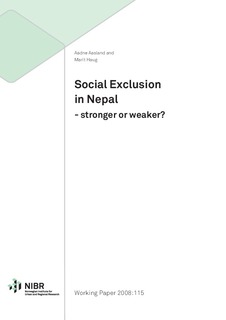| dc.contributor.author | Haug, Marit | |
| dc.contributor.author | Aasland, Aadne | |
| dc.date.accessioned | 2019-08-15T07:41:50Z | |
| dc.date.accessioned | 2021-04-29T13:56:22Z | |
| dc.date.available | 2019-08-15T07:41:50Z | |
| dc.date.available | 2021-04-29T13:56:22Z | |
| dc.date.issued | 2008 | |
| dc.identifier.isbn | 978-82-7071-742-2 | |
| dc.identifier.issn | 0801-1702 | |
| dc.identifier.uri | https://hdl.handle.net/20.500.12199/2485 | |
| dc.description.abstract | Last ned gratis This paper looks at the challenges of social exclusion in Nepal and the interrelationship with recent political developments in the country. We argue that the poor record of addressing social exclusion among the mainstream political parties of Nepal is a key factor in explaining the high level of support for the Maoists in the April 2008 Constituency Assembly (CA) elections. Finally, policy implicatioans of social exclusion trends are discussed, with a focus on the role and potential contributions of the international community. We maintain that donors should support measures aimed at inclusion of marginalized and deprived groups, but at the same time be cautious about promoting interventions which reinforce or strngthen group boundaries. Tilknyttet prosjekt Oppsummering av NIBRs arbeid med Desentralisering i Nepal | no_NB |
| dc.publisher | Oslo: Norsk institutt for by- og regionforskning | |
| dc.relation.ispartofseries | NIBR-notat 2008:115 | |
| dc.subject | NIBR, PublikasjonerNIBR, Notat_NIBR | |
| dc.title | Social Exclusion in Nepal - stronger or weaker? | no_NB |
| dc.type | Notat | |
| fagarkivet.author.link | Haug, Marit;https://www.oslomet.no/om/ansatt/marhau | |
| fagarkivet.author.link | Aasland, Aadne;https://www.oslomet.no/om/ansatt/aadnea | |
